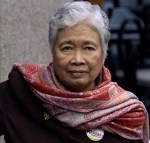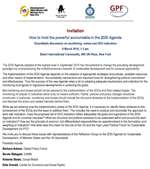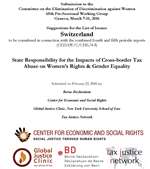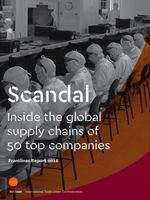Social Watch News
| Published on Fri, 2016-03-04 12:01 |
Published on Thu, 2016-03-03 17:52
With huge money comes huge accountability. For Leonor Briones, lead convenor of Social Watch Philippines (SWP), the billions of funds that would be poured into the soon-to-be-established Bangsamoro government should undergo thorough audit to ensure proper spending and hold specific people responsible for how the money is spent. By the reckoning of Moro Islamic Liberation Front (MILF) chief negotiation Mohagher Iqbal, the Bangsamoro government will get an initial funding of about P70 billion in its first year of operation, from various sources, including the block grant from the government. |
Published on Thu, 2016-03-03 17:47
There are strong indications that inequality may substantially contribute to and exacerbate the emergence and the course of financial crises, even if other factors, in particular financial deregulation, obviously also play a crucial role, according to a United Nations human rights expert. This finding has been highlighted by Mr Juan Pablo Bohoslavsky, the Independent Expert on the effects of foreign debt and other related international financial obligations of States on the full enjoyment of all human rights, particularly economic, social and cultural rights, in a thematic report for the UN Human Rights Council, currently holding its thirty-first session. |
Published on Wed, 2016-03-02 10:27
Invitation to an event on March 8, 2016 in New York: The 2030 Agenda adopted at the highest level in September 2015 has the potential to change the prevailing development paradigm by re-emphasizing the multidimensional character of sustainable development and its universal applicability. The implementation of the 2030 Agenda depends on the adoption of appropriate strategies and policies, available resources and other means of implementation. Accountability mechanisms are important tools for strengthening political commitment and effectiveness. Thus the success of the new Agenda relies a lot on adopting adequate mechanisms and indicators for the monitoring of progress or regressive developments in achieving the goals. |
Published on Tue, 2016-03-01 15:03
Tax avoidance and evasion represent a systemic drain on government revenues needed for the fulfilment of women’s rights and gender equality. As the international human rights system begins to grapple with the consequences of tax policy for human rights, a groundbreaking initiative is about to shine a bright light into the dark corners of financial secrecy. Switzerland – arguably the world’s most important tax haven — may soon face scrutiny from the United Nations human rights system over its role in facilitating cross-border tax abuse. A coalition of civil society organizations has asked the Committee on the Elimination of Discrimination Against Women (CEDAW) — the UN body mandated to oversee compliance with governments’ legal obligations related to women’s human rights — to examine the extra-territorial impacts of Switzerland’s opaque financial legislation on women’s rights and gender equality, particularly in developing countries. |
Published on Fri, 2016-02-26 12:56
The debate about regulatory versus voluntary reporting that should be required of financial institutions is very much alive. This is one of the messages coming out of the Transparency and Accountability in the Financial Sector study done by the international civil society network Fair Finance Guide International (FFG). |
| Published on Thu, 2016-02-25 23:00 |
Published on Thu, 2016-02-25 13:05
The global supply chains of 50 companies employ only six per cent of people in a direct employment relationship, yet rely on a hidden workforce of 94 per cent of their labour needs, according to new research from the International Trade Union Confederation. “Just 50 companies including Samsung, McDonalds and Nestle have a combined revenue of $3.4 trillion and the power to reduce inequality. Instead they have built a business model on a massive hidden workforce of 116 million people,” said Sharan Burrow, ITUC General Secretary. The ITUC report, Scandal: Inside the global supply chains of 50 top companies released on the eve of the World Economic Forum in Davos exposes an unsustainable business model, with a global footprint that covers almost every country in the world and profiles 25 companies with headquarters in Asia, Europe, and the United States. |
Published on Thu, 2016-02-25 12:56
Ministers and senior officials of developed countries agreed mid-February major changes to what can be counted as Official Development Assistance (ODA, or ‘aid’), opening the door for greater use of aid to subsidise private companies. A push by some states for greater aid spending on military and security costs was partly rebuffed, after strong campaigning from civil society organisations, while discussions on how to reduce the huge amount of foreign aid being diverted to cover spending in donor countries to support refugees will culminate later this year. |
Published on Wed, 2016-02-24 13:43
Civil society organizations have an opportunity to feed into an official but independent evaluation of the IMF policies and their impact on social protection in the coming weeks. The Bretton Woods Project (a UK-based NGO acting as a watchdog of the IMF and World Bank) will host a consultation with the Independent Evaluation Office of the IMF on the key issues. "This is an invaluable opportunity to influence how the IMF's record over the last decade on social protection will be evaluated in a report to the IMF executive board that is independent" explains the BWP in its newsletter. In the draft issues paper the IEO quotes from ILO work, indicating an appetite to critically examine the IMF's record. |
SUSCRIBE TO OUR NEWSLETTER










